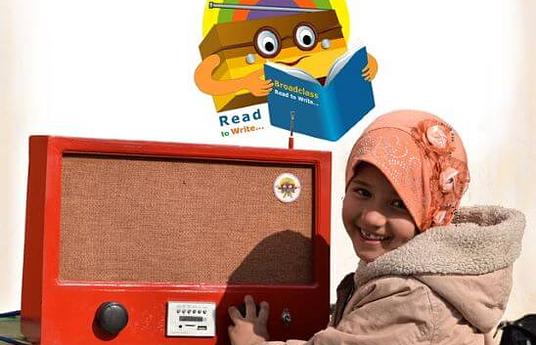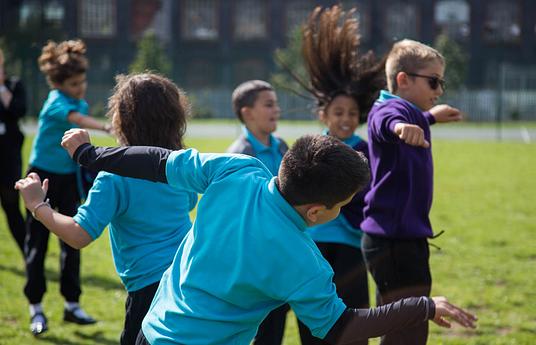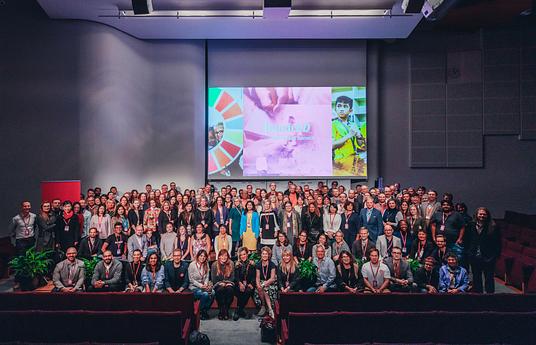Back in November 2018, we launched the HundrED Global 2019 collection of inspiring innovations in a packed auditorium in Helsinki. Hundreds of educators, innovators, and ambassadors from around the world came to celebrate, with many more people tuning in over live stream from home.
In the opening segment of the launch event, ten innovators from various countries and continents addressed the crowd, using their three minutes to share how their innovation is helping children around the world to flourish.
Last week, we published the video of the first five innovators speaking at the launch event. Here’s what the second group of innovators had to say...
Personalized Learning Paths (Finland)
Pekka Peura is a well-recognized teacher in Helsinki, and the founder of Personalized Learning Paths
Explaining why a personalized approach matters, Pekka explains, “Whenever I am planning or designing my teaching, I try to keep two things in my mind. The first is about learning. I think about Vygotsky’s Zone of Proximal Development, which means we cannot learn things that are really below our skills, something we already know, and we cannot learn the things that are so high above our current skills that we don’t even know how to begin.”
“The second I consider is that in Finland among 15 year old students, the skill gap between the best and weakest students is seven school years. And in Finland, the gap is the smallest in the world.”
“ That means that If I go into the classroom and want to make learning possible for each and every child, I need to divide my teaching into seven different school years...In Finland, 4% of students after 12th grade have the math ability of a child in 2nd grade.”
“So, we need to do something, and that’s why we need personalized learning paths.”
Initiative for Peace (Singapore)
The United World College of South East Asia founded and runs the Initiative for Peace. Its motto? “Youth connecting youth to build sustainable and positive peace”, Ellen Heyting explains.
Initiative for Peace is a peace education curriculum where for the first half of the program students are trained in leadership development skills, facilitation skills, and peace and conflict studies. During the second half, the students focus in on a post-conflict situation somewhere in the world, and design and prepare to implement a peace education conference.
Ellen goes on to explain how students then give up the first week of their summer break and travel to that area of the world to orchestrate a peace conference for youth on both sides of that conflict. In past, this has included places like Kashmir, Cambodia, and Timor-Leste, to name a few.
But instead of explaining how important peace education is, Ellen got the audience to engage in a peace-building activity. (Watch the video to see what happened!)
Graduate Aims Database (USA)
“I’d like to play 'what if' with you,” begins Tyler Thigpen.
“What if there was a small city who decided to get together all of the families who lived there, to have a conversation about what they wanted to be true about the 17- and 18-year-olds in that city. What is the profile of the graduate they want their schools to produce?”
“You might imagine on one hand they’d be excited because these are good things for children, but also perhaps a little nervous or scared because they realize their students don’t have much time at school to practice these important learning outcomes. Whatsmore teachers, as excellent as they are, might not feel confident or trained to create a classroom that's designed to create those innovative learner outcomes.”
“If they took an honest look at their school model, they might realize their school is set up to deliver on traditional academic outcomes but not these more innovative learner outcomes.”
So what do you do?
That’s why Transcend created Graduate Aims Database. It’s a free, open-source resource available to anyone, with a collection of summaries of innovative learning outcomes that allow teachers, school leaders, and school designers to apply cutting edge research to help them design innovative learning environments.
Increasingly, Transcend's partner schools want to design learning environments that cultivate not just traditional academic outcomes, but also social and emotional factors like grit and perseverance, global competencies like social justice and intercultural competence, as well as transferable skills like creativity and collaboration. They are using the Graduate Aims Database to tweak and improve the design of their learning environments, to cultivate a more holistic and broad set of learner outcomes.
Challenge 59 (UK)
“Ten years ago, McDonald’s promised to serve you in 59 seconds,” begins Joanna Rhodes.
“At the time, I was dance artist in residence in one of the most deprived wards in the UK, working with police, drug action teams, and public health, where every Friday night, 250 young people would descend on a field to get drunk, some of them as young as seven.”
There was a child relocated due to the bereavement of both parents, who positively oozed confidence and formed strong immediate social bonds. Finally, the boy excluded from school with a scar on his head, I later found out his dad had taken a machete to him, he managed to secure a further terms worth of funding to keep dance within his school.”
“I wondered what I could do in 59 seconds to empower young people in matters of their own wellbeing. Unfortunately, ten years on, child health inequalities are worsening. There's rising mental health issues, a physical inactivity epidemic, and the way we interact with each other is changing. Public Health England now states that for the first time ever, we will outlive the younger generation.”
Challenge 59 is a collaborative school project that puts young people at its heart. They use dance as a vehicle to embody learning about health and amplify youth voice by producing their 59-second health films about local issues. Student films are being screened nationally and internationally, but perhaps more importantly, children have developed the agency to share among families and communities. One boy’s dad stopped smoking after seeing his child’s film premiere on the dangers of cigarettes.
In an academic evaluation of Challenge 59, over 94% of children said they felt more confident, calmer and more successful, enjoyed trying new things and wanted to keep dance within their school.
“Challenge 59 is fostering local and global citizens who can think, feel, relate to one another, be themselves, affect change. and live happy and healthy lives.”
Broad Class Listen to Learn (Pakistan)
Broad Class Listen to Learn is an innovation program making basic education accessible. “It offers interactive radio instruction for literacy, numeracy, and English as a second language. The core element is complemented by face to face teacher training, material development, and community sport, plus an evaluation mechanism to administer student learning performances as a result of the intervention”, explains Fakhira Najib.
So far, the program has benefitted more than 100,000 children in all kinds of schools and has reached more than one million people listening to the broadcast daily.
Fakhira explains that the radio is still the largest source of communication in most parts of the country. “The program has broadened access to unbiased global information, not only in the local language but also in English, thus heavily influencing the perception of the West and impacting openness towards economic growth and values such as universal human rights, among communities who would otherwise be difficult to reach.”
“Pakistan has the second most out of school children in the world, 2.5 million children 5-15 years, and 51% of those are girls. We need to replicate Broad Class, not only in Pakistan but also in the entire region, as it’s easy to replicate and a most cost-effective educational intervention.”
“According to DFID, the per child per annum cost is less than $1.10. If given support, we can create a ripple effect by ensuring children have access to quality education that is rooted in gender equality.”
Like what you've heard so far? Find the complete HundrED 2019 collection of inspiring innovations, including contact details to reach out, here.




